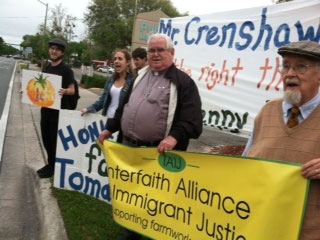
At least 40 people protested at the Publix at the corner of University Avenue and 34th Street as part of Farmworker Awareness Week. Photo by Phil Kellerman.
by Richard K. MacMaster
One week in early Spring, we remind ourselves that we depend on the farm workers who plant and harvest the fruits and vegetables we eat every day of the year. Theirs is the most hazardous, worst paid, and most essential job in the United States. Over the past century, natives and immigrants—Bahamans, African Americans, Appalachian whites, Jamaicans, Mexicans, Haitians, Guatemalans and Salvadorans—have followed the harvest from South Florida to Michigan, living and working in oppressive conditions, not infrequently held in debt peonage or slavery by labor contractors.
Farm workers have made remarkable gains in the last few years. The Fair Food Agreement negotiated by the Coalition of Immokalee Workers with 95 percent of Florida tomato growers and a long list of big tomato buyers is one outstanding example. Buyers and growers agreed to an extra penny a pound for the workers and better working conditions, including an end to sexual harassment. But these real gains are fragile, as long as some growers and some buyers refuse to sign. Within the past year, Trader Joe’s and Chipotle signed the agreement, but Publix and Wendy’s still refuse to even talk with farm worker delegations.





